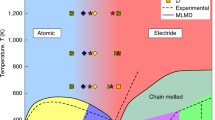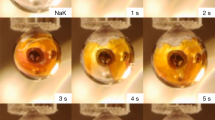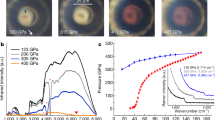Abstract
EVIDENCE has recently been obtained which strongly suggests that ‘solvated’ electrons in water at room temperature have an absorption band in the 15,000 cm−1 region1. Jortner and Sharf2 found a similar absorption in frozen aqueous solutions of alkali metal hydroxides at 17,000 cm−1 after exposure to 200 kV X-rays, which they attributed to trapped electrons, although they favoured an ‘expanded’ orbital on the cation as the trapping centre2.
This is a preview of subscription content, access via your institution
Access options
Subscribe to this journal
Receive 51 print issues and online access
$199.00 per year
only $3.90 per issue
Buy this article
- Purchase on Springer Link
- Instant access to full article PDF
Prices may be subject to local taxes which are calculated during checkout
Similar content being viewed by others
References
Boag, J. W., and Hart, E. J., Nature, 197, 45 (1963).
Jortner, J., and Sharf, B., J. Chem. Phys., 37, 2506 (1962).
Symons, M. C. R., J. Chem. Soc., 1189 (1963).
Author information
Authors and Affiliations
Rights and permissions
About this article
Cite this article
BLANDAMER, M., SHIELDS, L. & SYMONS, M. Solvated Electrons in Alkali Glasses. Nature 199, 902–903 (1963). https://doi.org/10.1038/199902b0
Issue Date:
DOI: https://doi.org/10.1038/199902b0
Comments
By submitting a comment you agree to abide by our Terms and Community Guidelines. If you find something abusive or that does not comply with our terms or guidelines please flag it as inappropriate.



